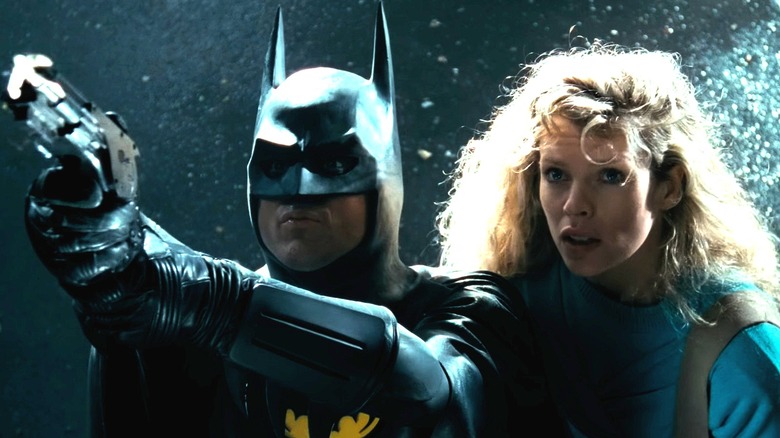Tim Burton's Batman Movie Idea That Paved The Way For The MCU
It's easy to forget or simply not understand what it was like to see Tim Burton's "Batman" in 1989. After decades of being viewed as a figure of fun-loving camp, Burton's dark, gothic vision for the Caped Crusader struck a chord with audiences. Not only did this help the film become 1989's highest-grossing movie release, it helped usher in a new era for comic book cinema. But perhaps the most substantial impact the film left on superhero movies came from one of Burton's more subtle suggestions.
Michael Uslan, who has been executive producer on every Batman film since Burton's movie, spoke with Traversing the Stars about Burton's concept that changed the game for superhero films. "This is the big idea that not only made Batman a success but opened the door to the Marvel Cinematic Universe," Uslan says. "He said to me, 'Michael, if we're going to do the first ever dark and serious comic book superhero movie, this movie cannot be about Batman ... This movie must be about Bruce Wayne."
The idea of giving the character's alter ego more emphasis than their heroic persona was one Marvel Studios ran with, according to Uslan. "Look at the Marvel movies. Stan [Lee] admitted this to me, and I'm sure Kevin Feige would agree — the 'Iron Man' movies ... should be called 'Tony Stark.' The 'Spider-Man' movie should really be called 'Peter Parker.'"
Keaton's dedication to Batman made it hard for him to work on later installments
Tim Burton's vision for Batman has proven to be a long-lasting one, and star Michael Keaton stayed loyal to that vision to the end. Along with Burton, Keaton deserves credit for reinventing the Dark Knight and superhero cinema as a whole. In fact, the Oscar nominee's take on the character in both "Batman" and the 1992 sequel, "Batman Returns," became so ingrained that it made it hard for him to gel with the vision for later entries.
Much like Burton, Keaton knew that mastering his depiction of Bruce Wayne was the key to making Batman work. On an episode of the Backstage podcast, In the Envelope, Keaton explained, "I know the name of the movie is 'Batman,' and it's hugely iconic and very cool. [But] I always knew from the get-go, it was Bruce Wayne. That was the secret." The actor goes on to explain how he read Frank Miller's comics to dive deeper into Wayne's tortured psyche.
For 1995's "Batman Forever," Burton's gothic edge was replaced by the zanier vision of director Joel Schumacher. While Keaton fought to keep his character intact, Schumacher was dead set on the new concept, which is part of why the actor ultimately decided to jump ship. "I kept trying to rationalize doing it and hopefully kind of talking [the director] into, 'I think we don't want to go in this direction,' And he wasn't going to budge," Keaton recalls. "I walked away going, 'Oh, boy, I can't do this.'" Of course, decades later, Keaton would reprise his iconic role for the DCEU film "The Flash," and though the footage will likely never be released, he also reprised the hero for "Aquaman and the Lost Kingdom" and the shelved "Batgirl" movie. It's no wonder his interpretation is so beloved, as just about every superhero movie owes something to Keaton's portrayal.
Fans wouldn't love the MCU if it weren't for its identifiable characters
The colorful, family-friendly Marvel Cinematic Universe is worlds away from Tim Burton's twisted take on Gotham City,but if it weren't for the groundwork laid by Burton, Michael Keaton, and others, it's hard to know if the MCU would have worked as well as it has. Not only did Burton's duology prove the financial viability of superhero cinema, but the work put into exploring Bruce Wayne's character paved the way for future comic book films to shine.
1989's "Batman" was far from the first time the character was depicted on screen, but the film gave audiences a more nuanced look into Bruce Wayne's world than ever before. From seeing how Wayne's tragic backstory unfolded to showcasing his life as a billionaire philanthropist, moviegoers could better sympathize with Wayne's struggles while also understanding his desire to fight crime. The depiction was so successful that many consider Keaton's Batman the best on-screen version of the character to this day, even after seeing the more modern takes from the likes of Christian Bale, Ben Affleck, and Robert Pattinson.
While the MCU is known for its grand-scaled set pieces and elaborate world building, it's ultimately the characters that make or break each entry, which is also where the influence of Burton's "Batman" films can be seen. Whether it's the massive moral questions presented to Tony Stark (Robert Downey Jr.), Steve Rogers' (Chris Evans) changing viewpoint of the world, or the Guardians of the Galaxy learning to overcome their personal battles to grow as a family, the characters behind the masks are what have kept audiences coming back to the MCU for over 15 years. So next time you hear Tony Stark proclaim, "I am Iron Man," know that we probably wouldn't have that iconic moment without Keaton stating, "I'm Batman," over 30 years ago.


